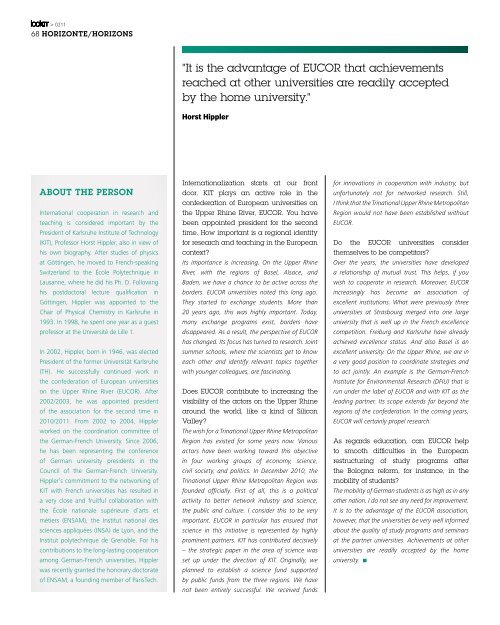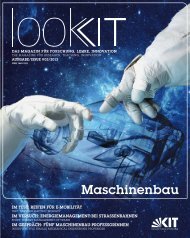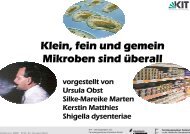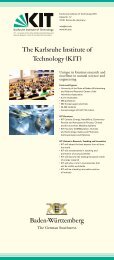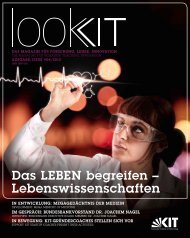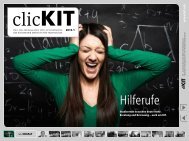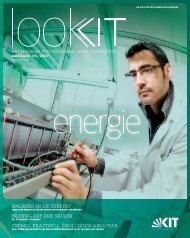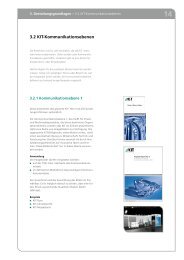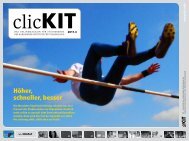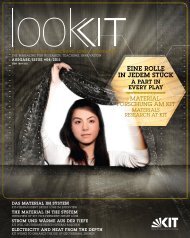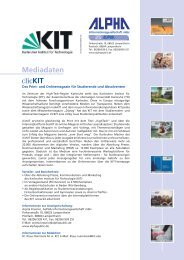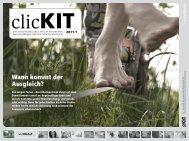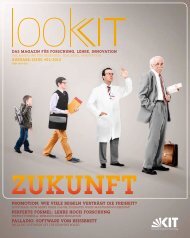lookKIT 02/2011 - PKM - KIT
lookKIT 02/2011 - PKM - KIT
lookKIT 02/2011 - PKM - KIT
Sie wollen auch ein ePaper? Erhöhen Sie die Reichweite Ihrer Titel.
YUMPU macht aus Druck-PDFs automatisch weboptimierte ePaper, die Google liebt.
<strong>02</strong>11<br />
68 Horizonte/Horizons<br />
"It is the advantage of EUCOR that achievements<br />
reached at other universities are readily accepted<br />
by the home university."<br />
Horst Hippler<br />
About the Person<br />
International cooperation in research and<br />
teaching is considered important by the<br />
President of Karlsruhe Institute of Technology<br />
(<strong>KIT</strong>), Professor Horst Hippler, also in view of<br />
his own biography. After studies of physics<br />
at Göttingen, he moved to French-speaking<br />
Switzerland to the École Polytechnique in<br />
Lausanne, where he did his Ph. D. Following<br />
his postdoctoral lecture qualification in<br />
Göttingen, Hippler was appointed to the<br />
Chair of Physical Chemistry in Karlsruhe in<br />
1993. In 1998, he spent one year as a guest<br />
professor at the Université de Lille 1.<br />
In 20<strong>02</strong>, Hippler, born in 1946, was elected<br />
President of the former Universität Karlsruhe<br />
(TH). He successfully continued work in<br />
the confederation of European universities<br />
on the Upper Rhine River (EUCOR). After<br />
20<strong>02</strong>/2003, he was appointed president<br />
of the association for the second time in<br />
2010/<strong>2011</strong>. From 20<strong>02</strong> to 2004, Hippler<br />
worked on the coordination committee of<br />
the German-French University. Since 2006,<br />
he has been representing the conference<br />
of German university presidents in the<br />
Council of the German-French University.<br />
Hippler’s commitment to the networking of<br />
<strong>KIT</strong> with French universities has resulted in<br />
a very close and fruitful collaboration with<br />
the École nationale supérieure d’arts et<br />
métiers (ENSAM), the Institut national des<br />
sciences appliquées (INSA) de Lyon, and the<br />
Institut polytechnique de Grenoble. For his<br />
contributions to the long-lasting cooperation<br />
among German-French universities, Hippler<br />
was recently granted the honorary doctorate<br />
of ENSAM, a founding member of ParisTech.<br />
Internationalization starts at our front<br />
door. <strong>KIT</strong> plays an active role in the<br />
confederation of European universities on<br />
the Upper Rhine River, EUCOR. You have<br />
been appointed president for the second<br />
time. How important is a regional identity<br />
for research and teaching in the European<br />
context?<br />
Its importance is increasing. On the Upper Rhine<br />
River, with the regions of Basel, Alsace, and<br />
Baden, we have a chance to be active across the<br />
borders. EUCOR universities noted this long ago.<br />
They started to exchange students. More than<br />
20 years ago, this was highly important. Today,<br />
many exchange programs exist, borders have<br />
disappeared. As a result, the perspective of EUCOR<br />
has changed. Its focus has turned to research. Joint<br />
summer schools, where the scientists get to know<br />
each other and identify relevant topics together<br />
with younger colleagues, are fascinating.<br />
Does EUCOR contribute to increasing the<br />
visibility of the actors on the Upper Rhine<br />
around the world, like a kind of Silicon<br />
Valley?<br />
The wish for a Trinational Upper Rhine Metropolitan<br />
Region has existed for some years now. Various<br />
actors have been working toward this objective<br />
in four working groups of economy, science,<br />
civil society, and politics. In December 2010, the<br />
Trinational Upper Rhine Metropolitan Region was<br />
founded officially. First of all, this is a political<br />
activity to better network industry and science,<br />
the public and culture. I consider this to be very<br />
important. EUCOR in particular has ensured that<br />
science in this initiative is represented by highly<br />
prominent partners. <strong>KIT</strong> has contributed decisively<br />
– the strategic paper in the area of science was<br />
set up under the direction of <strong>KIT</strong>. Originally, we<br />
planned to establish a science fund supported<br />
by public funds from the three regions. We have<br />
not been entirely successful. We received funds<br />
for innovations in cooperation with industry, but<br />
unfortunately not for networked research. Still,<br />
I think that the Trinational Upper Rhine Metropolitan<br />
Region would not have been established without<br />
EUCOR.<br />
Do the EUCOR universities consider<br />
themselves to be competitors?<br />
Over the years, the universities have developed<br />
a relationship of mutual trust. This helps, if you<br />
wish to cooperate in research. Moreover, EUCOR<br />
increasingly has become an association of<br />
excellent institutions. What were previously three<br />
universities at Strasbourg merged into one large<br />
university that is well up in the French excellence<br />
competition. Freiburg and Karlsruhe have already<br />
achieved excellence status. And also Basel is an<br />
excellent university. On the Upper Rhine, we are in<br />
a very good position to coordinate strategies and<br />
to act jointly. An example is the German-French<br />
Institute for Environmental Research (DFIU) that is<br />
run under the label of EUCOR and with <strong>KIT</strong> as the<br />
leading partner. Its scope extends far beyond the<br />
regions of the confederation. In the coming years,<br />
EUCOR will certainly propel research.<br />
As regards education, can EUCOR help<br />
to smooth difficulties in the European<br />
restructuring of study programs after<br />
the Bologna reform, for instance, in the<br />
mobility of students?<br />
The mobility of German students is as high as in any<br />
other nation. I do not see any need for improvement.<br />
It is to the advantage of the EUCOR association,<br />
however, that the universities be very well informed<br />
about the quality of study programs and seminars<br />
at the partner universities. Achievements at other<br />
universities are readily accepted by the home<br />
university.


